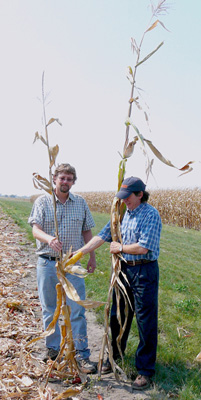 Ethanol interests are hoping that Congress might finally get the energy bill into conference committee this week.
Ethanol interests are hoping that Congress might finally get the energy bill into conference committee this week.
Brian Jennings with the American Coalition for Ethanol (ACE) says, “It sounds like Democrats and Republicans are beginning to work out some of the political differences and procedural differences they had in moving forward,” Jennings says. “I would predict that hopefully this week we will have an agreement to move forward on a bi-partisan, bi-cameral conference.”
There are some major differences to be worked out. For one, the House does not have the Renewable Fuel Standard that is present in the Senate bill. The Renewable Fuel Standard is a major goal of many in Congress. Senators Tom Harkin, D-Iowa, and Barack Obama, D-Ill., have introduced stand-alone legislation that would immediately update the Renewable Fuels Standard and require three-billion gallons of biofuels from cellulosic sources.
 Meanwhile, the Senate Agriculture Committee is finally scheduled to mark up a farm bill Wednesday morning, with chairman Tom Harkin announcing agreement on structure last week.
Meanwhile, the Senate Agriculture Committee is finally scheduled to mark up a farm bill Wednesday morning, with chairman Tom Harkin announcing agreement on structure last week.
Senator John Thune (R-SD) says the Senate version of the farm bill will include his legislation designed to promote the production of cellulosic ethanol produced from switchgrass, other native grasses and biomass feedstocks such as wood chips. Thune’s cellulosic ethanol bill, officially known as the Biofuels Innovation Program (BIP), was introduced in May.
Thune’s legislation includes cost-sharing for establishing energy-dedicated crops and paying competitive rent until the energy dedicated crops are sold. The legislation also encourages feedstock production by providing per-ton payments to producers of biomass, such as corn cobs, perennial grasses, and wood chips.


 Florida Agriculture and Consumer Services Commissioner Charles Bronson has announced
Florida Agriculture and Consumer Services Commissioner Charles Bronson has announced  GE Energy will provide Third Planet Windpower with 167 1.5 megawatt wind generators for wind farm projects in Texas, New Mexico, Nebraska and Wyoming that will be ready for turbines in 2009.
GE Energy will provide Third Planet Windpower with 167 1.5 megawatt wind generators for wind farm projects in Texas, New Mexico, Nebraska and Wyoming that will be ready for turbines in 2009.  Palm Tran, with its 9-10 million riders a year, will switch its 115 buses to biodiesel in a few months.
Palm Tran, with its 9-10 million riders a year, will switch its 115 buses to biodiesel in a few months.  The BioBike – a 100-mile-per-gallon, biodiesel-powered motorcycle – is racing 3,000 km (1,800 miles) across Australia.
The BioBike – a 100-mile-per-gallon, biodiesel-powered motorcycle – is racing 3,000 km (1,800 miles) across Australia. An article from
An article from  Awareness for ethanol is rippling throughout the American consumer market. Industry leaders across the board attest to that. And it’s the IndyCar Series that is identified as one of the big catalysts that caused those waves of awareness to ripple and spread. Dave Lewandowski wrote an
Awareness for ethanol is rippling throughout the American consumer market. Industry leaders across the board attest to that. And it’s the IndyCar Series that is identified as one of the big catalysts that caused those waves of awareness to ripple and spread. Dave Lewandowski wrote an  Now, however, it appears that maize itself may prove to be the ultimate U.S. biofuels crop. Early research results show that tropical maize, when grown in the Midwest, requires few crop inputs such as nitrogen fertilizer, chiefly because it does not produce any ears. It also is easier for farmers to integrate into their current operations than some other dedicated energy crops because it can be easily rotated with corn or soybeans, and can be planted, cultivated and harvested with the same equipment U.S. farmers already have. Finally, tropical maize stalks are believed to require less processing than corn grain, corn stover, switchgrass, Miscanthus giganteus and the scores of other plants now being studied for biofuel production.
Now, however, it appears that maize itself may prove to be the ultimate U.S. biofuels crop. Early research results show that tropical maize, when grown in the Midwest, requires few crop inputs such as nitrogen fertilizer, chiefly because it does not produce any ears. It also is easier for farmers to integrate into their current operations than some other dedicated energy crops because it can be easily rotated with corn or soybeans, and can be planted, cultivated and harvested with the same equipment U.S. farmers already have. Finally, tropical maize stalks are believed to require less processing than corn grain, corn stover, switchgrass, Miscanthus giganteus and the scores of other plants now being studied for biofuel production. Ethanol producer VeraSun is considering sinking $30 million into a process that would allow the company to also get biodiesel out of its ethanol production.
Ethanol producer VeraSun is considering sinking $30 million into a process that would allow the company to also get biodiesel out of its ethanol production.